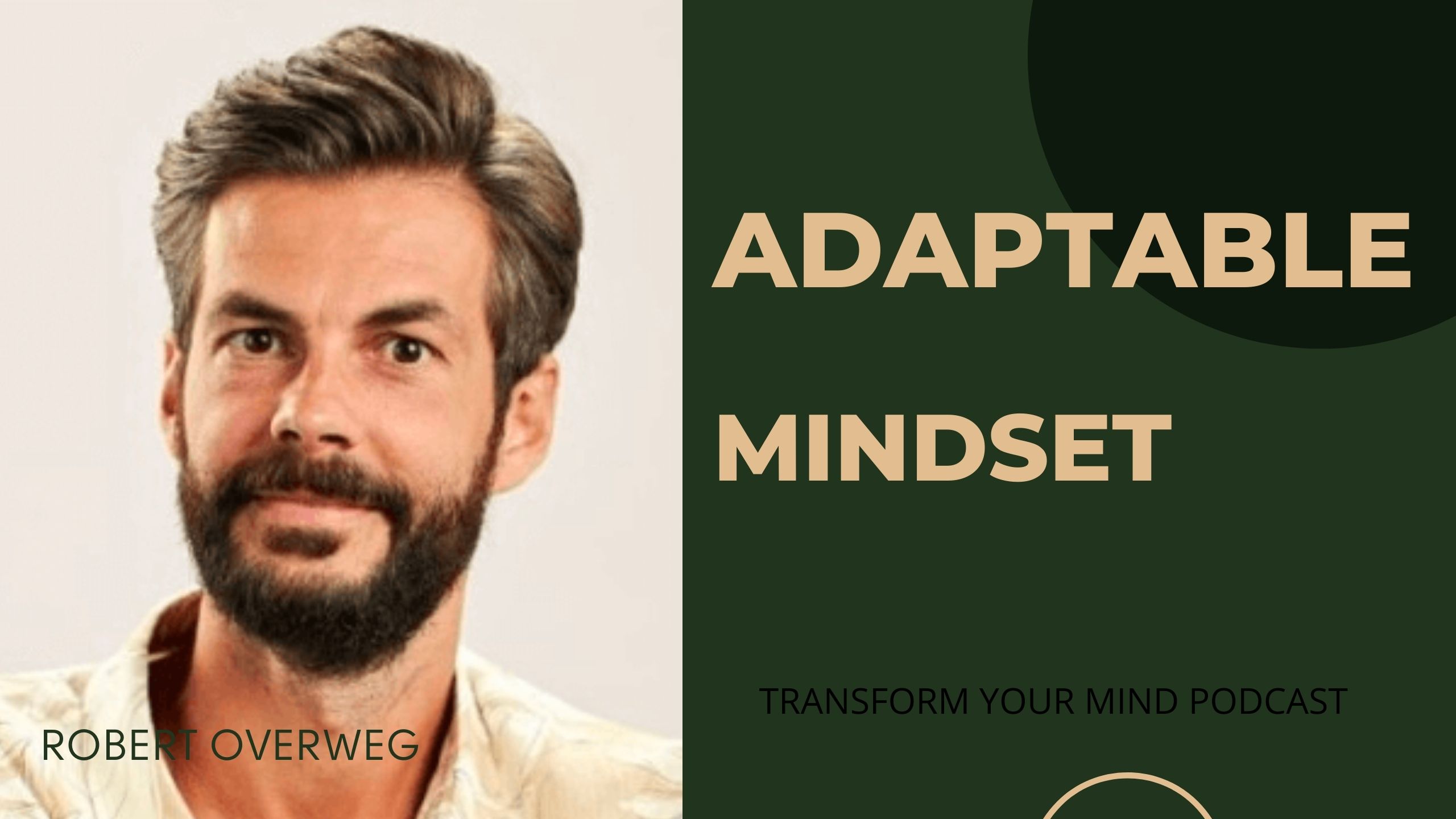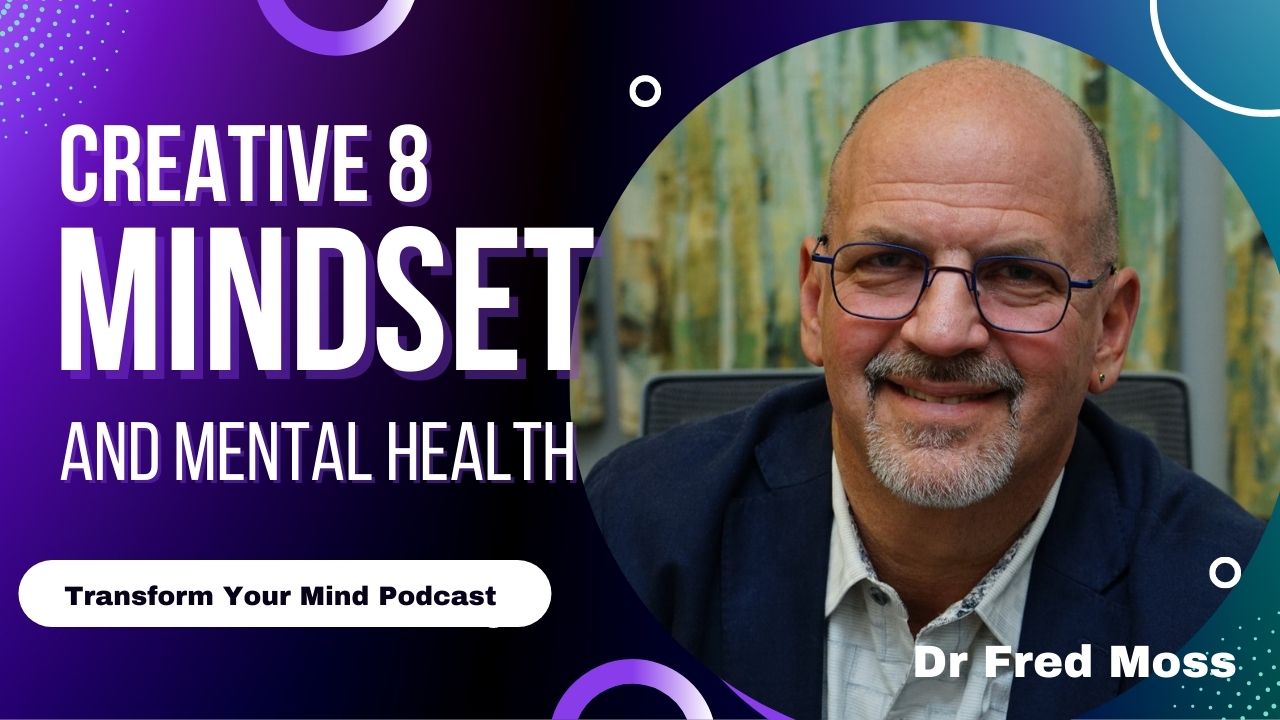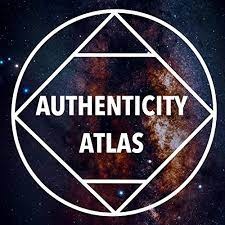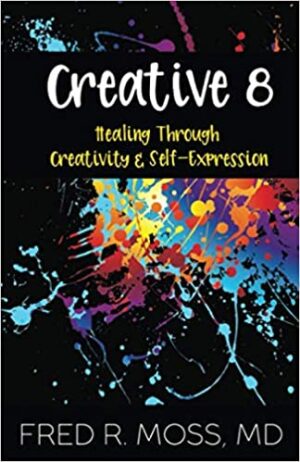When you have an, adaptable mindset, it means you're going to be, adaptable, to almost anything in life. So, what's the definition of an, adaptable mindset, and how can we develop it?
Download the podcast here
Bio
Robert Overweg is the founder of the, Adaptable Mindset program. He and his team empower people to develop their own, adaptable Mindset, to develop mental flexibility. Learn how to create, mental space, and to find new possibilities. In our rapidly changing world, we keep feeling the impact of unpredictable events to which we have to adapt.
Robert teaches how, adaptability, is about empowerment and finding new perspectives. The Adaptable Mindset program has been applied at several Fortune 500 companies including Chanel, and Heineken, multiple SMEs and innovative schools. They have also supported over a thousand students and solopreneurs with their online program.
Myrna: What do you credit your, adaptable mindset, to even as a kid?
Sponsored Ad
This episode is brought to you by The Jordan Harbinger Show.
Want a new podcast to look forward to each week? One that’s entertaining, informative, and packed with actionable content? Of course, you do.
The average podcast listener has 6 shows in rotation, so you’re most likely not only listening to The Transform Your Mind podcast — So, I’d love to share a podcast to add to your list:
The Jordan Harbinger Show, a top shelf podcast named best of Apple in 2018..Jordan dives into the minds of fascinating people — from athletes, authors and scientists to mobsters, spies and hostage negotiators.
I really think there just isn’t a better podcast to listen to casually or seriously to expand your worldview. He’s also got a strangely relatable weekly segment called, “Feedback Friday,” where he covers advice on everything from relationships and networking to asking for a raise.
You can’t go wrong with adding The Jordan Harbinger Show to your rotation. It’s incredibly interesting, there’s never a dull show.
Search for The Jordan Harbinger Show on Apple Podcasts, Spotify, or wherever you listen to podcasts.

Developing an adaptable mindset as a child
Robert: My parents gave me a lot of freedom to explore. The told me, hey, if you want to be an artist or professor, do what makes you happy. I was always photographing crawling around and founded my own photography company when I was like 17 years old. I was very naïve and I thought, hey, I can do this. I was just always failing forward again and again. I noticed that a lot of people haven't had that upbringing. But it's not necessarily to have such an upbringing to be able to flow through life.
You can also find it later on, but it takes work and that's why we found with the, Adaptable mindset program, and like all of our testimonials show that people can find their spark and find their drive can find these different perspectives again. You can make the work fun and you can make the work playful so it's it doesn't feel like a work just creating, mental space.
Myrna: When I was growing up, everybody said that, you needed to be a lawyer or a doctor, to be considered successful and they were stuck in that. If they didn't go to medical school or they didn't become a lawyer, they kind of felt that they were a failure of some sort, you know what I mean?
So, a, creative mindset, would definitely be an, adaptable mindset. Because in order to have, creativity, you've got to let energy flow through, you got to let source flow through. You got to be in touch with and feeling your environment. So that's probably why you gravitated towards, adaptability, and started your design company at 17. You had that, creativity, almost kind of built in.
So, like I started off by saying, we are, adaptable. As human beings we were born with the ability to be, adaptable. So why do we need that, adaptability? Why do you think that God hardwired us to be, adaptable, people?
Sponsored AD
WHETHER IT’S BY MOONLIGHT…OR CANDLELIGHT…MOONLIGHT APPAREL WILL GET YOU AND YOUR PARTNER IN THE MOOD! SLIP INTO SOMETHING SEXY AND SENSUAL…….OR PLAYFUL AND FUN. WITH OUR INCREDIBLE COLLECTION OF BEAUTIFUL LINGERIE AND INTIMATE APPAREL…YOU’LL FIND THE PERFECT ATTENTION GRABBING GARMENT TO LET YOUR INNER AND OUTER BEAUTY SHINE!
FROM THE ULTRA FEMININE…TO THE EDGY AND ELEGANT. OUR ALLURING APPAREL IS GUARANTEED TO SET YOUR HEART ON FIRE…AND MAKE YOUR EVENING SIZZLE! WE EVEN OFFER ENTICING CLOTHING FOR THE MEN, TOO!
AT MOONLIGHT APPAREL, YOUR PASSION IS OUR PASSION. VISIT US ONLINE AT https://moonlightapparel.com/

We have to adapt to survive
Robert: God did it to everything. From nature to animals otherwise you aren't able to survive. It's just a very natural thing to do. Also, if we look at new theories, we also see that it's not just survival of the fittest and adaptation. It's also working together and that's maybe something that we forgot a little bit as humankind. Most of us have heard about survival of the fittest, but not about doing as a collaborative effort. And yeah, I think like everyone also has the ability to have an, adaptable mindset, we make so many silly rules, which narrow our frame of view, which limit our own, creativity.
And then we put upon our children and we teach that limitation in schools as well because we make life simpler than it is. we compartmentalize things at school. So, we deny people who understand the entirety, you are not trained in intuition you're not trained in in compassion. You're not trained in imagination. It's mainly different kinds of sports, more of the art skills and then you get grades. And then if you if you don't pass your grades, then you're a failure like entire system is set up to compartmentalize not really help you.
Adaptable mindset in business, is the same in organizations too much compartmentalization. You're not really valued for your, creativity. And then we have media which is constantly distracting your social media which is railroads are thinking we're constantly being narrowed in a frame of view we're being boxed in. And that's not how we are meant to be meant to be. You should be able to find your own path and do whatever the heck you want actually, as long as it contributes to the to the greater good.
Sponsored Ad
Kee beez ft. Child’s play Kidd
Zone2zone
An Adaptable mindset is adaptable to change
Myrna: When I thing of an, adaptable mindset, I'm thinking along the lines of, adaptable to change. Alright, so let's take the pandemic. We had to do a lot of changes and we had to, adapt. In fact, they're saying that we will never go back to where we were before. So, let's say that, we're accustomed to the grind of getting up in the morning at six o'clock and taking the train or driving in rush hour traffic to get to work and then all of a sudden, you are stuck at home by yourself.
You don't have people to talk to, you don't you don't have that communication with people. A lot of people got really depressed, because they didn't have that outlet. So, talk about that kind of, adaptability. Why do we need, adaptability, for things like crisis?
Robert: A lot of people, of course, everyone went through this experience, and some fared better than others. Right? A lot of people indeed became depressed and weren't really connected anymore to what inspired them. The people who did flourish, often took care of themselves, or went out for walks, did their own exercising, took care of proper nutrition, maybe even getting in touch with the restoration.
So, everyone has to decide. It doesn't matter if he fails, then you pick up the next one and just keep on expanding the mind even putting new information in and just keep on repeating that. Also being conscious of how the world reacts to it and what the world needs. So okay, now I need to work from home. But what can I do? You can do that by finding different perspectives and assessing how you can get out of the situation or how you can get the most out of it while remaining calm.
The world is very demanding, you need to find that countermeasures to be able to get clarity again and to connect again to what you want to do instead of the outside world.

Most people don't like change
Myrna: As you were talking, I remembered that a lot of times me personally and some people that don't like change, right? And anytime that you have opportunity to change, you kind of want to stay the same because you're comfortable there. But I found that anytime I resist change, and then I leap forward into it, It works out a whole lot better than what I was didn't want to change from. Who would have thought that people would like to work from home. But now they're finding reasons that it's a whole lot better.
You kind of, adapt, to whatever situation you're in and that's probably why God programmed us with, adaptability, because things change. Even our wealth and our health, sometimes you can go from, being very wealthy and then you're poor, and you got to, adapt. People don't really, adapt, but they at least try. Or you go from being healthy one day to being bed ridden the next day.
You got to find a way to make that work for you. You know what I mean? So, when I think of, adaptability, that's what I'm thinking of, any situation that has changed, and you got to fix it. One day you are married and you’ve got the second income and all of a sudden, you're divorced and you now you are a single mom struggling to pay your bills. We all have to develop an, adaptability mindset.
Who moved my cheese
We always resist change. I remember way back when I was in the corporate world, they, you know, one of my companies made us read this book, Who Moved My Cheese, and they made all employees read that book as part of the onboarding training because they know that people hate change, and everybody's gonna resist change. Corporations hire coaches to help people, adaptability mindset.
What are some of the pros the pros, of an, adaptable mindset?
Robert: If you have an, adaptable mindset, there’s room for growth? You ask yourself, what can I learn from it? If there's nothing that you can learn from it, just move on.
Myrna: Yeah, there's always something you can learn even if it's not what not to do. So, if we find that our personalities are the type of person that we don't like change, we're stuck in the same mode. You know, that our parents told us to do, you know what I mean? We're not growing, we're not curious. We're just stuck. How can someone in that space, develop adaptability? Is there like some steps that they can do?
Robert: Yeah, I think it's very beneficial to start with what you're curious about. Because what you're curious about is about, adaptability.
Myrna: A lot of people that are not curious, let's assume they're not curious. They're just gonna do what they know.

Curiosity leads to adaptability
Robert: Well, there's always something that you can be curious about. It can even be a TV program or channel on discovery or whatever. You do need to have a sense of, curiosity, still in you, otherwise, there needs to be a willingness from the individual. You know, that it starts there. It starts with you taking that step forward, and putting more of the stuff in your life, which inspires you.
And if you find something even if it slightly makes you curious, then keep on exploring and keep on pulling on that thread and through more of that into your life. It could also be that you just feel that your mind is totally overflowing and you don't have any space, you don't have any time to be curious.
Myrna: With an, adaptable mindset, you can change because the mindset is your software, right? So, when you have an, adaptable mindset, that means you're going to be, adaptable, to almost anything in life. So, let's discuss what is an, adaptable mindset, your definition. How can we develop that mindset?
The adaptable mindset is about openness
Robert: That's what, mindset, is that you're always able to find a fresh perspective that you have openness, openness to new ideas is a very large aspect of that. Because openness allows you to see more things. It's also about expanding our frame of mind. You know, everyone has their own specific frame of mind through which they look through the world.
And sometimes we forget that everyone has their own specific frame of mind, that the frame is like a letterbox issue to the world. It narrows your frame of view whether you notice it or not. So, it's always a good idea to start chipping away at that frame to try and expand it and expose yourself to art, to movies, to music that it lights up your soul and do that often and maybe less of the Instagram scrolling. Did you know that Kim Kardashian has a new boyfriend? Not really expanding her frame of mind?
Myrna: Yes, a lot of time and other people's business take up space in our mind. Everyone is now watching Johnny Depp.
Robert: We need to create more brain space to also filter more content, but also work on creating more cognitive flexibility through movement through sports like yoga, meditation, cycling, strength training, all of these things are scientifically proven to create more cognitive flexibility. It makes you better able to deal with uncertainty and ambiguity like strength training, strong mind and body because a strong body equals a strong mind.

Creating mental space
It's so extremely logical, but we are we've become such sedentary creatures and we're always sitting in a chair on our phone. And of course, you'll be more flexible because you've got such so much data of solutions and possibilities and your, subconscious mind, is able to make new connections. The other important thing is it's what you see with people who have great scientific discoveries Nobel Prize winners. All of these people, they also have, mental space.
And they had ways to sort of resynthesize what they experienced by playing violin, doing juggling unicycling going for long walks, going sailing, and doing that for hours. When do we still take time ever do nothing? Absolutely nothing. Or just react to something like violin or go for a walk. It's often that we have a second device for doing something else or thinking about something to think different and to speak different as well.
So, what we see is that most people change when they encounter change. They say, Ah, it's not possible. Oh, that will never happen here. And you know, all like these walls that they put up. And it's debatable if that is very helpful. But what might be more beneficial is to always think positive and how it could be possible. And just always having that open view.
The Adaptable Mindset program
Myrna: Your, adaptable mindset program, you said that you have helped over 1000 students and a lot of entrepreneurs you know solo entrepreneurs. Tell us about your program.
Robert: So, we have an online program, which is curiosity based, it's very playful. You can choose your own boss through the program and you can start with our nature game’s philosophy, doesn't really matter. And just take all your inspiration and expand your mind. There is a masterclass in there as well on how to create, mental space. There is a segment on how to deal with a, fear of failure, like all things that you use during your development, and you can just choose what you need and what resonates with you.
You don't have to do everything or actually anything at all. I don't really mind like as long as it actually works for you. So, we've got the online program, and then we do workshops, and organizational transformation in these larger organizations as well. And then normally, the first week with Chief Technology Officer head of innovation, head of digital, someone in a leadership position, and then we talk about the ENA company. How other teams are structured, what people are lacking, how to stop being stressed out, these kinds of things and then make a custom program to support people in resolving these challenges. So, you get more creativity, more imagination, more mental space, because that is what most organizations need.
Myrna: That's awesome. What's your website?
Robert: www.adaptablemindset.com
Additional Resources













